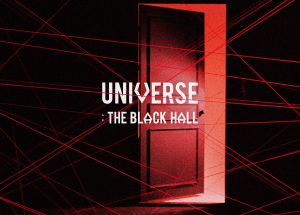
More than three years after their debut, Pentagon have finally released their first full-length album. It has been a tumultuous journey up to this point in their career, and Pentagon are using Universe: The Black Hall to reinvent themselves and introduce fans to a new sound and vision for the group.
After debuting in 2016, this Cube Entertainment boy group struck gold and earned new fans with their 2018 breakout hit “Shine,” but they struggled to maintain that success with subsequent bright concepts. They then lost a standout member, rapper E’Dawn, after his ejection from the company. Chinese member Yanan has also been on hiatus for eight months, sitting out of the group’s last two comebacks and their 2019 world tour.
Pentagon were in need of a fresh start and pulling a 180-degree swing from comical and boyish concepts to brooding and sexy seemed like a smart move, especially in the current K-pop landscape. Older groups known as dark concepts such as VIXX and Exo have somewhat vacated their throne while their members cycle through mandatory military service. Many younger groups are scrambling to see who has what it takes to fill that void in the industry. Pentagon have thrown their hat in the ring with this album, which does have some compelling, creative darker tracks — they are just unfortunately buried late in the tracklist.

The album title and artwork for Universe: The Black Hall set the scene for listeners. The album art is a door cracked open slightly, crisscrossed with foreboding red lines. If listeners dare, they can follow Pentagon down a dark hallway into a sinister new world that Pentagon are crafting with all of their creative abilities combined.
The eleven-song album kicks off with the lead single “Dr. Bebe,” which Wooseok co-wrote with Hui, who also contributed to the song’s composition. The song is about the cycle of “love, fall, hurt, and crazy” that repeats until you finally find the right person to break the cycle. The track begins with anthemic chanting and a grandiose opening line from Kino. The chanting element disappears, however, and is replaced with a deep, dirty bassline overlaid with a generic trap beat. “Dr. Bebe” lacks a memorable hook or melody and stands up far less as a song when listened to apart from the visuals of the MV or a live stage.
The song’s strongest elements are the powerful vocals. Kino’s soft lines in the pre-chorus effectively build drama in the song. Hui and Jinho‘s high notes soar theatrically on their chorus lyrics “but can’t get away from the echo,” fully embodying the overwhelming sound they are surrounded by as well as the frustration of the lyrics. Hongseok‘s haunting falsetto in the bridge is a lovely palette cleanser before the song’s overloaded finale.
As a title track, “Dr. Bebe” does not give Pentagon a strong enough foundation to leap into a bright future as dark concept kings. As for the other tracks, Universe: The Black Hall meanders in the shallows before diving into the meat of the album.
After the dramatic force of their first track, Pentagon follow the standard K-pop album pattern by moving to “Asteroid.” This laid-back, unexciting B-side does not further the album’s supposed aim of drawing in listeners with a dark new sound. The song features a fun, high-pitched, spacey effect but lacks enough personality and color from the members to make it memorable.
Pentagon slow things down even more for track number three, “Shower of Rain.” It perhaps should have been placed later on the tracklist along with “Asteroid” because of its pace and dreamy, sleepy atmosphere. But after all the tricks in the instrumentals of the first two tracks, the stripped-back opening of this song and Hui’s “now what can I say” line are absolutely attention-grabbing.

Although it starts off slow, “Die For You” brings back the intensity to the album with electric guitar riffs and driving percussion. Kino contributed to the lyrics and composition of the track. “Die For You” sounds like the more romantic, sensual cousin of “Dr. Bebe,” making it better suited to be the album’s second song.
The song’s balance of more restrained and more powerful portions creates a satisfying emotional journey. The layered vocal distortions in the pre-chorus are a grungy contrast to the crisp, clear chorus. The rasp Jinho adds to his voice in the final chorus really amps up the desperate emotion of the song.
Pentagon continue to explore their sophisticated, sensual side with the groovy, guitar-driven “Talk.” Much like “Asteroid,” “Talk” has a prominent electronic effect, but it is much more integrated into the rest of the song and actually provides this more mature R&B-tinged track with just the right amount of offbeat, whimsical Pentagon charm.
Sexy snaps kick-off “The Black Hall,” which seems poised to resemble Pentagon’s previous comeback “Sha La La” before veering off in a completely unexpected direction at the chorus. The piano and percussion drop out, and a sleazy, breathy chorus slithers in, punctuated by falsetto riffs. All the portions are not fully flowing and cohesive, but this song finally delivers the exciting new side to Pentagon that the group promised in their album title.

The album’s goal was to make fans see Pentagon in a new way by letting the group showcase their abilities and unique vocal and rap colors. The album features a variety of tempos and song styles, but the center trio of songs “Die for You,” “Talk,” and “The Black Hall” best showcase Pentagon’s mature, confident and sultry sides. As the namesake track of the album, “The Black Hall” feels like the album’s primary destination, with each track before it building to it. After that, the album devolves into “miscellaneous” as the remaining songs do not quite seem to relate to each other at all.
“Worship U” throws it back to Pentagon’s schoolboy charms with a pure, sweet message. The vocalists sound sure, strong and sincere in their delivery, which shines over the lower-pitched synths, making them seem more assured and mature in their convictions than past romantic Pentagon songs.
After the pop confection of “Worship U,” listeners are almost given whiplash with the sitar instrumentation, Middle Eastern-inspired beats and hard-hitting swagger of “Zoom Up.” It is one of just two tracks on the album that a Pentagon member did not help write or compose.

Refreshingly, the daring song does not rely on the instrumentation as a novelty, gimmick or crutch. The arresting instrumentation does get somewhat buried beneath retro, SM-style K-pop synths and layered vocals in the pre-chorus, but it breaks back through in time for the simple chorus helmed by the rap line. If there was any doubt that this was another sexy B-side, look no further than the outro English lyrics “drip, wet, drip, wet, wet, wet.”
After this adventurous foray, Pentagon return to the K-pop playbook and close out the main body of the album with a pretty ballad dedicated to their fans. The sing-song lullaby quality of this track paired with the music box-like sound effects and the soaring high notes elevate this ballad beyond a forgettable fan song.
The album officially ends with two bonus songs of sorts. “Someday” is a duet between Jinho and Hui that sounds like something off of a drama OST. After that comes a Korean version of Pentagon’s second Japanese single, “Happiness,” a bouncy, ’90s hip-hop and R&B-inspired track that ends the album on a playful note with a fun, retro twist on the group’s bright concepts.
Both of Pentagon’s previous Japanese comebacks, “Cosmo” and “Happiness,” experiment with different sounds, song structures and concepts, and it is a shame that something on par with the electricity of “Cosmo” is not on this album.
“Cosmo” combines steel drum percussion, sharp violins and strumming Spanish guitar into one cinematic ride. The B-sides that get closest to this level of ambition and innovation are “The Black Hall” and “Zoom Up.” These are the kind of tracks that Pentagon should prioritize as they make fans want to listen to the next song and the next and the next because they cannot predict what Pentagon will do next.
While the core of the album gives a more focused glimpse of Pentagon’s future, the rest of the album feels scattered. Thankfully some core qualities were present throughout the album that partially held it together: vocal power, mature confidence and some enamoring musical quirks that made songs quintessentially Pentagon’s.
The title of Universe: The Black Hall implies that more entries to the Universe saga will follow. Hopefully, future sequels will see the group continue to push themselves creatively and finally claim a new, post-“Shine” sound and niche in the industry that showcases all their talents.
(YouTube [1][2]. Images and lyrics via Cube Entertainment. )


